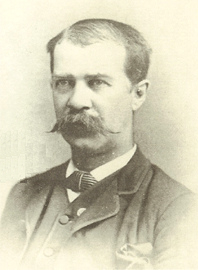Dyer Lum
| Dyer Daniel Lum | |
|---|---|

Dyer D. Lum, c. 1890
|
|
| Born | 1839/1840 Northampton, Massachusetts |
| Died | April 6, 1893 (aged 53–54) Boston, Massachusetts |
| Cause of death | Suicide |
| Resting place | Northampton, Massachusetts |
| Other names | Dyer D. Lum |
| Known for | Labor activism |
| Partner(s) | Voltairine de Cleyre |
Dyer Daniel Lum (1839 – April 6, 1893) was a 19th-century American anarchist, labor activist and poet. A leading anarcho-syndicalist and a prominent left-wing intellectual of the 1880s, Lum is best remembered as the lover and mentor of early anarcha-feminist Voltairine de Cleyre.
Lum was a prolific writer who wrote a number of key anarchist texts, and contributed to publications including Mother Earth, Twentieth Century, Liberty (Benjamin Tucker's individualist anarchist journal), The Alarm (the journal of the International Working People's Association) and The Open Court among others. Following the arrest of Albert Parsons, Lum edited The Alarm from 1892–1893.
Traditionally portrayed as a "genteel, theoretical anarchist", Lum has recently been recast by the scholarship of Paul Avrich as an "uncompromising rebel thirsty for violence and martyrdom" in the light of his involvement in the Haymarket affair in 1886.
In disposition, Mr. Lum was most amiable; in the character of his mind he was philosophical; in mental capacity, he was at once keen and broad. His friends, who were many, mourn his passing away.
Lum was a descendant of the prominent New England Tappan family; his grandfather was an American revolutionary. In hopes of bringing about the end of slavery, he volunteered to fight for the Union Army in the American Civil War. He served as an adjutant in the Fourteenth New York Cavalry, and later as a brevet captain, seeing combat in the Red River Campaign. A bookbinder by trade, Lum became active in the American labor movement in the aftermath of the war. He served as a secretary to Samuel Gompers and ran for lieutenant governor of Massachusetts on the Labor Reform ticket of abolitionist Wendell Phillips in 1870.
...
Wikipedia
